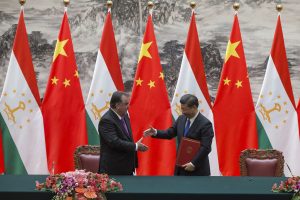From 2014, when The Diplomat Magazine’s first issue was published, to today there has been no story bigger than that of China’s ongoing rise. Its geopolitical gravity, sheer economic weight, and unavoidable presence have had innumerable impacts in countries throughout Asia. In Central Asia, especially, China’s story has dovetailed with the region’s autocratic atmosphere and desperate development needs. Tajikistan is a prime case study.
On the cover of Issue 31 (June 2017), Christian Bleuer marked the 20th anniversary of the end of the devastating Tajik Civil War. “Tajikistan is at peace,” he wrote, “but its future remains bleak.” Later, in Issue 52 (March 2019), Till Mostowlansky surveyed the country’s troubled Pamir region and noted the interplay between kleptocratic systems, resource extraction, and unrest; the latter a theme revisited by myself in Issue 91 (June 2022). In Issue 87 (February 2022), Sher Khashimov shed light on Tajikistan’s energy struggles, a product of rising demand, dilapidated infrastructure, and government mismanagement.
In the following article Khashimov returns to highlight the myriad ways China has deepened its involvement in Tajikistan, tying many of the previously explored domestic circumstances to geopolitics in a story that echoes many we have followed across Asia.
– Catherine Putz
“This place has changed quite a bit, right?” says Dilshod on a bumpy, dusty drive up to Iskanderkul, arguably Tajikistan’s most famous lake, in July 2022.
As Iskanderkul shows up from behind a mountain ridge, people in the car marvel at how murky its waters look. “It’s probably because of everything they’re dumping into the river that feeds the lake,” comments Dilshod, who works in tourism around Iskanderkul (and who asked not to use his real name). He points at a collection of buildings and machinery barely visible in the southeast corner of the lake.
The buildings are part of Kanchoch, a collective name used by locals to describe a group of antimony and gold deposits being developed by Talco Gold. Created in 2015, Talco Gold, a subsidiary of Tajikistan’s state-owned aluminum company, is evenly split between the government of Tajikistan and the Chinese mining giant Tibet Hua Yu Mining. Hua Yu invested $200 million and brought in 150 workers from China in 2018 to build out the infrastructure required for mining gold and antimony at high altitude. The project finally went online in early 2022, but it has been transforming the heart of Tajikistan’s pristine Fann mountains for the past several years.
“They made the roads wider and brought in electricity lines to Sarytag. We now have electricity more often than not,” says Dilshod about his village, located just a few kilometers west of Kanchoch. But he is torn over whether the presence of the China-bankrolled project is good for the area, as the environmental impacts – increased dust and noise from trucks, diversion and pollution of the rivers that feed Iskanderkul, deforestation – are hard to ignore.
“There are rumors that [the Chinese] are going to mine for coal near Khayronbed and Dizhik too,” Dilshod adds with a sigh, speaking about the villages located downstream from Iskanderkul.
Kanchoch is one of countless manifestations of how the relationship between China and Tajikistan is shaping the poorest country in the former Soviet space.
And Tajikistan’s alarmingly all-encompassing dependence on China is a regional story.

































